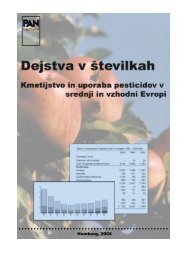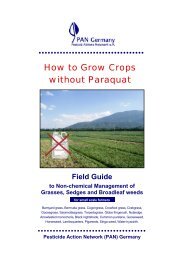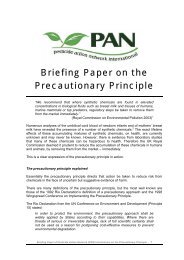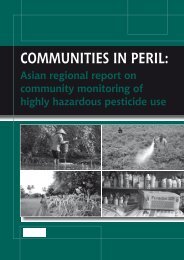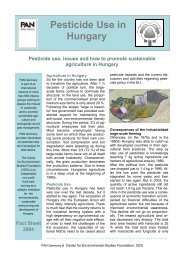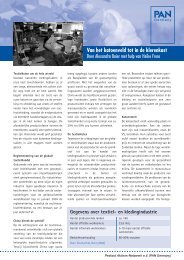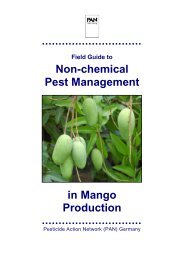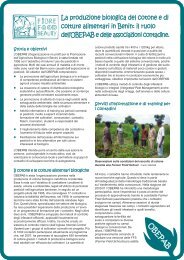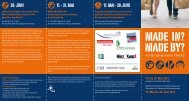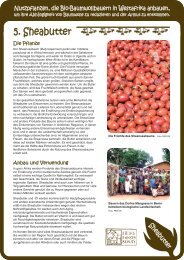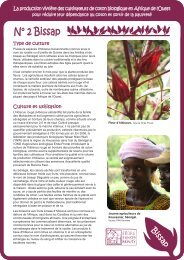You also want an ePaper? Increase the reach of your titles
YUMPU automatically turns print PDFs into web optimized ePapers that Google loves.
Hibiscus, cashew and cotton<br />
- what’s the common thread?<br />
Thousands<br />
of African<br />
smallholder<br />
farmers now grow<br />
organic cotton, used<br />
in clothing, cotton<br />
wool and other textiles<br />
sold in Europe.<br />
Organic cotton cultivation has brought these<br />
farming families significant benefits in health,<br />
welfare and income but global cotton prices<br />
are notoriously unstable, even for organic<br />
cotton. So farmers are anxious not to be<br />
dependent on cotton alone for their cash<br />
income and keen to find better markets for the<br />
food crops they grow.<br />
Farmers also plant useful trees along their field<br />
borders, such as cashew nut trees or<br />
hibiscus shrubs. Hibiscus flowers are used<br />
to make a delicious red fruit drink known as<br />
bissap in West Africa. Farm families also<br />
care for wild trees like the shea nut<br />
which produces oil-rich fruits<br />
used in cooking.<br />
Fibre, Food & Beauty for Poverty Reduction is a joint project of PAN Germany, PAN<br />
UK, OBEPAB from Benin and Enda Pronat from Senegal. It aims to raise<br />
awareness among European businesses, donors, civil society organisations and<br />
consumers about trade models which can help reduce poverty. Partners seek<br />
ethical trading relations between cotton-based organic projects and European food<br />
and cosmetic companies.<br />
The project is funded by Europe Aid Co-operation Office, InWent and TRAID.<br />
PAN UK<br />
Development House<br />
56-64 Leonard Street<br />
London EC2A 4LT. UK<br />
email: admin@pan-uk.org<br />
+44 (0)20 7065 0905<br />
www.pan-uk.org<br />
This publication has been produced with the assistance of the<br />
European Union. The contents of this publication are the sole<br />
responsibility of PAN UK and can in no way be taken to reflect<br />
the views of the European Union.<br />
PAN Germany<br />
Nernstweg 32<br />
D-22765 Hamburg<br />
GERMANY<br />
email: info@pan-germany.org<br />
+49 (0)40 399 191 00<br />
www.pan-germany.org<br />
Photo credits:<br />
front page (organic cotton farmers) - Britta Pichler; page 3 (sesame crop) - Enda Pronat; page<br />
3 (cotton and cashew nut trees) - OBEPAB; page 4 (federation des producteurs) - Britta<br />
Pichler; page 5 (alternative produce) - PAN Germany; pages 2+6 (dried hibiscus) - Britta Pichler<br />
Did you<br />
know that<br />
African organic<br />
cotton farmers….<br />
grow over 20 different<br />
cereals, nuts, vegetables and<br />
other crops to produce a huge<br />
range of foods, drinks, oils,<br />
fibres and dyestuffs? These<br />
include staple foods of maize,<br />
sorghum, millet and peanut,<br />
along with minor crops such as<br />
sunflower, beans and peppers.<br />
Some of these are used by<br />
the household, while others<br />
are sold in local or regional<br />
markets, or for export.
Good for the soil and good for farming families<br />
Improving market options for food crops<br />
What you can do to support African farm families<br />
Organic farming is not just leaving out<br />
agrochemicals– instead it aims to build an<br />
ecologically-based farming system that is in<br />
balance with nature. Under organic principles,<br />
good crop rotation – sowing different crops on a<br />
particular field each season – is essential. The<br />
aim is to prevent the build-up of harmful insect<br />
pests or crop disease sources, which is especially<br />
important for organic farmers since they do not<br />
spray synthetic pesticides. A popular rotation in<br />
Senegal is peanut in the first year; followed by two<br />
different cereals in the second and third years;<br />
cotton in the fourth; and then a year fallow to let<br />
the soil rest.<br />
Ask your retailer for organic and Fairtrade products containing sesame, honey,<br />
cashews and other nuts and dried and fresh fruits and vegetables from Africa.<br />
Find out about the good stories behind food grown by African organic and<br />
Fairtrade smallholders at the Fibre, Food & Beauty webpages at<br />
www.pan-uk.org/foodAfrica<br />
Express your views on the ethics of food from Africa on PAN UKʼs web poll<br />
www.pan-uk.org/foodAfrica<br />
Find out more about organic cotton production in Africa and its benefits at PAN<br />
UKʼs one-stop information centre at www.WearOrganic.org<br />
Find out where you can buy organic clothing and textiles in stores and on-line<br />
via PAN UKʼs Shop for organic cotton consumer directory at<br />
www.WearOrganic.org<br />
Sesame<br />
is one of<br />
the crops<br />
grown in<br />
rotation with<br />
organic<br />
cotton<br />
Organic<br />
cotton<br />
growing<br />
between<br />
rows of<br />
cashew nut<br />
trees<br />
African organic cotton farmers also plant different<br />
crops within one field, which helps to confuse<br />
pests and discourage disease. Sunflower works<br />
as a good ʻtrap cropʼ which is highly attractive to<br />
key pests like the cotton bollworm. Pests<br />
congregate in the trap crops, leaving the main<br />
crops largely pest-free. Legume rotation crops<br />
(peas and beans) are especially important to<br />
organic farmers, who do not use artificial fertiliser,<br />
because these plants fix nitrogen, providing<br />
essential nutrients for plant growth. Legumes are<br />
vital as a source of protein for families who may<br />
not be able to afford meat or dairy.<br />
By growing a wide range of food crops,<br />
which are not sprayed with<br />
pesticide, organic cotton<br />
farmers help provide<br />
safe and healthy food<br />
for local communities.<br />
Most food crops grown on African organic<br />
cotton farms are used by the family or sold<br />
in local markets. However, growing food for<br />
local markets is not always an attractive<br />
option as prices are often low. Farmers in<br />
organic cotton projects in Senegal and<br />
Benin want to increase their options in local<br />
markets but demand from local consumers<br />
and traders for organic versions of their<br />
food crops is still limited.<br />
The farmer associations are therefore<br />
exploring opportunities for exporting<br />
selected food crops. Demand is increasing<br />
in European markets for organic supplies of<br />
several of the food crops that they already<br />
grow. More consumers and food companies<br />
are taking an interest in sourcing from<br />
African smallholders for ethical reasons,<br />
supporting farm families through ʻtrade, not<br />
aidʼ, to help combat poverty in rural areas.<br />
Organic farmer associations in Senegal and<br />
Benin are working with local NGOs Enda<br />
Pronat and OBEPAB to focus on European<br />
export options for five of their food crops:<br />
hibiscus; sesame; fonio cereal; cashew and<br />
sheanut. These have been chosen by<br />
farmers because they can be fairly easily<br />
grown and are useful rotation crops in their<br />
organic farming systems. None of the crops<br />
are a part of the staple diet so cultivating<br />
them for export will not undermine local<br />
food security.<br />
Sesame seeds and cashew nuts are wellknown<br />
in Europe and widely used in a<br />
range of cereals, snacks, as well as<br />
cooking oils. Sheanut butter is a valued<br />
ingredient for cosmetic use. Hibiscus<br />
flowers are less well-known but can be<br />
used for colouring, flavourings and make a<br />
delicious fruit juice, rich in vitamin C and<br />
anti-oxidants. Fonio is a tiny cereal grain,<br />
used traditionally in West Africa as<br />
a special treat food at family<br />
gatherings. Fonio is<br />
gluten-free, rich<br />
in protein and<br />
easy to digest<br />
and can be<br />
integrated into a<br />
huge range of<br />
recipes using rice<br />
or wheat flour.



